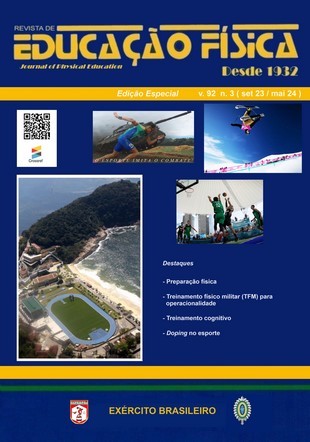Abstract
Introduction: As part of this Special Issue, the Revista de Educação Física / Journal of Physical Education (REF/JPE) presents scientific aspects of physical training to high performance sports and military operational.
Objective: To present and recommend the reading of the study by Staiano & Merlini on the physical, cognitive and multitasking performance enhancement of professional soccer athletes through combined physical-cognitive training.
Conclusion: The negative effects of induced acute mental fatigue, when associated with physical training, have been pointed out as a possible way to increase performance in sports competitions. The results presented by the authors can be used to support the review of the current training protocols for professional soccer athletes, aiming at the inclusion of cognitive tests to improve performance.
References
Boksem MAS, Tops M. Mental fatigue: Costs and benefits. Brain Research Reviews. 2008;59(1): 125–139. https://doi.org/10.1016/j.brainresrev.2008.07.001.
Marcora SM, Staiano W, Manning V. Mental fatigue impairs physical performance in humans. Journal of Applied Physiology. 2009;106(3): 857–864. https://doi.org/10.1152/japplphysiol.91324.2008.
Meeusen R, Van Cutsem J, Roelands B. Endurance exercise-induced and mental fatigue and the brain. Experimental Physiology. 2021;106(12): 2294–2298. https://doi.org/10.1113/EP088186.
Coutts AJ. Fatigue in football: it’s not a brainless task! Journal of Sports Sciences. 2016;34(14): 1296–1296. https://doi.org/10.1080/02640414.2016.1170475.
Staiano W, Merlini M, Romagnoli M, Kirk U, Ring C, Marcora S. Brain Endurance Training Improves Physical, Cognitive, and Multitasking Performance in Professional Football Players. International Journal of Sports Physiology and Performance. 2022;17(12): 1732–1740. https://doi.org/10.1123/ijspp.2022-0144.
Buchheit M. The 30-15 intermittent fitness test: accuracy for individualizing interval training of young intermittent sport players. Journal of Strength and Conditioning Research. 2008;22(2): 365–374. https://doi.org/10.1519/JSC.0b013e3181635b2e.
Scott BR, Hodson JA, Govus AD, Dascombe BJ. The 30-15 Intermittent Fitness Test: Can It Predict Outcomes in Field Tests of Anaerobic Performance? The Journal of Strength & Conditioning Research. 2017;31(10): 2825. https://doi.org/10.1519/JSC.0000000000001563.
Paravlic AH, Simunic B, Pisot R, Rauter S, Stuhec S, Vodicar J. The reliability, validity and usefulness of the 30–15 intermittent fitness test for cardiorespiratory fitness assessment in military personnel. Scientific Reports. 2022;12: 16087. https://doi.org/10.1038/s41598-022-20315-3.
Mohoric U, Sibila M, Abazovic E, Jovanovic S, Paravlic AH. Comparison of the Field-Based Intermittent Running Fitness Test 30-15 and the Treadmill Multistage Incremental Test for the Assessment of Cardiorespiratory Fitness in Elite Handball Players. International Journal of Environmental Research and Public Health. 2022;19(6): 3535. https://doi.org/10.3390/ijerph19063535.
Stanković M, Gušić M, Nikolić S, Barišić V, Krakan I, Sporiš G, et al. 30–15 Intermittent Fitness Test: A Systematic Review of Studies, Examining the VO2max Estimation and Training Programming. Applied Sciences. 2021;11(24): 11792. https://doi.org/10.3390/app112411792.
Stroop JR. Studies of interference in serial verbal reactions. Journal of Experimental Psychology. 1935;18(6): 643–662. https://doi.org/10.1037/h0054651.
Scarpina F, Tagini S. The Stroop Color and Word Test. Frontiers in Psychology. 2017;8. https://doi.org/10.3389/fpsyg.2017.00557.
Basner M, Mollicone D, Dinges DF. Validity and Sensitivity of a Brief Psychomotor Vigilance Test (PVT-B) to Total and Partial Sleep Deprivation. Acta astronautica. 2011;69(11–12): 949–959. https://doi.org/10.1016/j.actaastro.2011.07.015.
Jones MJ, Dunican IC, Murray K, Peeling P, Dawson B, Halson S, et al. The psychomotor vigilance test: a comparison of different test durations in elite athletes. Journal of Sports Sciences. 2018;36(18): 2033–2037. https://doi.org/10.1080/02640414.2018.1433443.
Klichowski M, Wicher A, Kruszwicka A, Golebiewski R. Reverse effect of home-use binaural beats brain stimulation. Scientific Reports. 2023;13: 11079. https://doi.org/10.1038/s41598-023-38313-4.
Eriksen BA, Eriksen CW. Effects of noise letters upon the identification of a target letter in a non-search task. Perception & Psychophysics. 1974;16(1): 143–149. https://doi.org/10.3758/BF03203267.
Fröhlich S, Kutz DF, Müller K, Voelcker-Rehage C. Cardiorespiratory fitness is associated with cognitive performance in 80 + -year-olds: Detangling processing levels. GeroScience. 2024;46(3): 3297–3310. https://doi.org/10.1007/s11357-024-01065-8.
Kawashima R, Satoh K, Itoh H, Ono S, Furumoto S, Gotoh R, et al. Functional anatomy of GO/NO-GO discrimination and response selection--a PET study in man. Brain Research. 1996;728(1): 79–89.
Barch DM, Carter CS, MacDonald AW, Braver TS, Cohen JD. Context-processing deficits in schizophrenia: diagnostic specificity, 4-week course, and relationships to clinical symptoms. Journal of Abnormal Psychology. 2003;112(1): 132–143.
Valadez EA, Morales S, Buzzell GA, Troller-Renfree SV, Henderson HA, Chronis-Tuscano A, et al. Development of Proactive Control and Anxiety Among Behaviorally Inhibited Adolescents RH = Control and Anxiety in Adolescence. Journal of the American Academy of Child and Adolescent Psychiatry. 2022;61(12): 1466–1475. https://doi.org/10.1016/j.jaac.2022.04.012.
SOMA Technologies. Soma: Engineered To Enhance Human Performance. SOMA. https://soma-npt.ch/ [Accessed 17th April 2024].
Dallaway N, Lucas SJE, Ring C. Concurrent brain endurance training improves endurance exercise performance. Journal of Science and Medicine in Sport. 2021;24(4): 405–411. https://doi.org/10.1016/j.jsams.2020.10.008.
Marcora SM, Staiano W, Merlini M. A Randomized Controlled Trial of Brain Endurance Training (BET) to Reduce Fatigue During Endurance Exercise: 754 Board #150 May 27, 3: 30 PM - 5: 00 PM. Medicine & Science in Sports & Exercise. 2015;47(5S): 198. https://doi.org/10.1249/01.mss.0000476967.03579.44.
Dallaway N, Lucas S, Marks J, Ring C. Prior brain endurance training improves endurance exercise performance. European Journal of Sport Science. 2023;23(7): 1269–1278. https://doi.org/10.1080/17461391.2022.2153231.
Pageaux B, Lepers R, Dietz KC, Marcora SM. Response inhibition impairs subsequent self-paced endurance performance. European Journal of Applied Physiology. 2014;114(5): 1095–1105. https://doi.org/10.1007/s00421-014-2838-5.
Cona G, Cavazzana A, Paoli A, Marcolin G, Grainer A, Bisiacchi PS. It’s a Matter of Mind! Cognitive Functioning Predicts the Athletic Performance in Ultra-Marathon Runners. PloS One. 2015;10(7): e0132943. https://doi.org/10.1371/journal.pone.013294.

This work is licensed under a Creative Commons Attribution 4.0 International License.
Copyright (c) 2024 Journal of Physical Education
